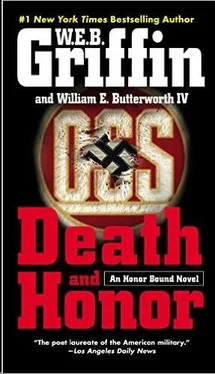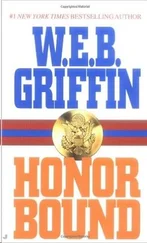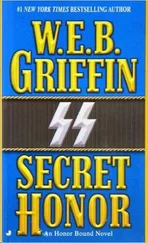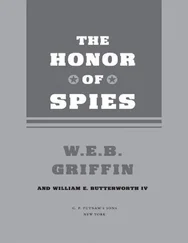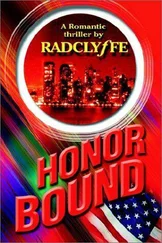Griffin W.E.B. - Honor Bound 04 - Death and Honor
Здесь есть возможность читать онлайн «Griffin W.E.B. - Honor Bound 04 - Death and Honor» весь текст электронной книги совершенно бесплатно (целиком полную версию без сокращений). В некоторых случаях можно слушать аудио, скачать через торрент в формате fb2 и присутствует краткое содержание. Год выпуска: 2009, Издательство: Penguin USA, Inc., Жанр: Старинная литература, на английском языке. Описание произведения, (предисловие) а так же отзывы посетителей доступны на портале библиотеки ЛибКат.
- Название:Honor Bound 04 - Death and Honor
- Автор:
- Издательство:Penguin USA, Inc.
- Жанр:
- Год:2009
- ISBN:нет данных
- Рейтинг книги:4 / 5. Голосов: 1
-
Избранное:Добавить в избранное
- Отзывы:
-
Ваша оценка:
- 80
- 1
- 2
- 3
- 4
- 5
Honor Bound 04 - Death and Honor: краткое содержание, описание и аннотация
Предлагаем к чтению аннотацию, описание, краткое содержание или предисловие (зависит от того, что написал сам автор книги «Honor Bound 04 - Death and Honor»). Если вы не нашли необходимую информацию о книге — напишите в комментариях, мы постараемся отыскать её.
Honor Bound 04 - Death and Honor — читать онлайн бесплатно полную книгу (весь текст) целиком
Ниже представлен текст книги, разбитый по страницам. Система сохранения места последней прочитанной страницы, позволяет с удобством читать онлайн бесплатно книгу «Honor Bound 04 - Death and Honor», без необходимости каждый раз заново искать на чём Вы остановились. Поставьте закладку, и сможете в любой момент перейти на страницу, на которой закончили чтение.
Интервал:
Закладка:
What had somewhat surprised Colonel A. F. Graham were the airplanes that had carried him from Natal, Brazil, to Argentina. They were both Lockheed Lodestars.
He’d flown from Miami to Natal—with fuel stops in Trinidad and Belem— in great luxury aboard a Panagra Boeing 314—the same “Dixie Clipper” that had in January flown President Roosevelt to the Casablanca Conference. It was an enormous forty-two-ton flying boat powered by four 1,600-horsepower engines. Aboard was a bar and comfortable bunks, and first-class food had been served by Panagra stewards in crisply starched white jackets.
They’d spent the night in luxurious accommodations in Belem, then flown the next morning on to Natal, an eight-hour flight during which they had averaged a bit over 125 miles per hour. This was as far south as the big seaplanes went. From Natal, they either flew across the South Atlantic to British Gambia on the African Coast or returned to Miami.
The Panagra flights to Natal always carried high-priority supplies and senior officers bound for the large U.S. Army Air Forces base at Brazil’s Pôrto Alegre, and thus routinely were met by a USAAF plane from Pôrto Alegre. The last time Graham had gone to Argentina, that aircraft had been a B-24 and everyone had had to sit on the floor.
This time, the airplane had been a Lodestar—one painted olive drab, making it in USAAF parlance a C-60—fitted out to transport seven passengers in the comfort befitting Air Forces senior officers.
That had made Graham wonder how long there had been a plethora of Lodestars before Hap Arnold had confided in Roosevelt the amazing success of the aircraft production system.
And when he’d gone to the civilian side of the airfield at Pôrto Alegre to board a Varig flight to Buenos Aires, he again had been surprised to see that it too was a Lodestar, also apparently brand new, but this time configured as a normal airliner with seats for fourteen passengers.
The stewardess told him that the Brazilian airline had recently acquired a dozen of the airplanes.
This, of course, forced him to think of Roosevelt’s “suggestion” that Cletus Frade start an airline in Argentina. He wondered if Roosevelt had other reasons for making the suggestion. In his experience with the President, the reason advanced for one idea or another was most often not the real one.
Graham, admiringly, not pejoratively, thought that Franklin Delano Roosevelt could have given lessons in political maneuvering to Niccolò Machiavelli.
Colonel Martín was standing just inside the immigration and customs booths in the terminal.
“Colonel Martín, what a pleasant surprise!” Graham greeted him cheerfully in Spanish, putting out his hand.
“Have a nice flight, did you, Colonel?”
“Actually, I think you’re supposed to call me ‘Mr. Secretary,’ ” Graham said.
“What is that saying of your Corps of Marine infantry, ‘Once a Marine, always a Marine’?”
“And that is actually the ‘Marine Corps’ instead of what you said,” Graham replied. “Tell you what: Why don’t you call me ‘Alejandro’? Or better yet, ‘Alex’?”
“I’m afraid that would annoy my German friends—you know how fond they are of their titles and ranks—who might think we were being too friendly, but thank you just the same.”
“And we must never forget evenhanded neutrality, right?”
“You understand my problem,” Martín said, smiling. “But perhaps, when we are alone, and we are sure no one can hear or is watching, we can call one another by our Christian names.”
“I’d like that, but I understand the BIS is always watching and listening.”
“So I’ve heard,” Martín said. “Are you going to be with us long, Mr. Secretary? ”
“Probably not long at all,” Graham said. “Perhaps we could have lunch.”
“You’ll be staying where?”
“I don’t think you’re supposed to ask me that,” Graham said. “But in the spirit of friendship, I’ll tell you: at the Alvear Palace.”
“I thought you perhaps might be staying with Major Frade.”
“Are you referring to Don Cletus Frade, by any chance?”
Martín, smiling, snapped his fingers and shook his head ruefully.
“I just can’t seem to get it straight in my mind that he’s no longer an officer of your Corps of Marines, but one of our most respected estancieros. ”
“Perhaps you should write it on the palm of your hand, if you have trouble remembering. And to answer another question you shouldn’t be asking: I feel sure that sometime during my visit, I will avail myself of Don Cletus’s famous hospitality.”
“When you see Don Cletus, please express my regards?”
“I’ll be happy to.”
“May I offer you a ride into Buenos Aires, Mr. Secretary?”
“I wouldn’t want to inconvenience you.”
“Not at all. The Alvear is right on my way.”
“Then thank you, Colonel.”
[FIVE]
Suite 407 Alvear Palace Hotel Avenida Alvear 1891 Buenos Aires, Argentina 1645 4 July 1943
Graham just had time to go into his suitcase for a change of linen and his toilet kit when there was a knock at his door.
When he opened the door, Cletus Frade was standing there. Behind him was Suboficial Mayor Enrico Rodríguez, Ejército Argentino, Retired. Graham saw that Rodríguez’s trench coat, worn over his shoulder, did not entirely conceal the self-loading shotgun he carried against his leg.
Graham waved them into the room.
“I wondered when I was going to see you, Major,” Graham said.
“I didn’t want to intrude on your conversation with Martín,” Frade said.
“You have any idea what that was all about?”
“I think he was sending us both a message that he’s watching us.”
“Is there a situation here I don’t know about?”
“That qualifies as a massive understatement,” Frade said.
“What’s with the shotgun?”
“Enrico has sworn an oath to God that what happened to my father will not happen to me,” Frade said.
Graham met Frade’s eyes and saw in them that what he’d said was a statement of fact.
“Unless you really want to stay here, I think you’d be more comfortable at San Pedro y San Pablo,” Frade said. “And we have to go there anyway.”
“Why do we have to go there anyway?”
“Today is the Fourth of July, and you, Colonel Graham, sir, will be the senior officer present as the local OSS detachment celebrates Independence Day.”
Graham met his eyes again and saw that Frade was serious about this, too.
“Won’t Martín know?”
“If we leave right now, we can probably get away from here before Martín can get his people in place to surveil you.”
Graham closed his suitcase.
“Okay,” he said.
Frade’s enormous Horch was parked in the Alvear Palace’s covered, off-the-street driveway, and when Frade, Graham, and Enrico came out of the revolving door, the top-hatted doorman hurried to open the rear door of the car.
Frade, who was carrying Graham’s bag, walked quickly to it, threw the bag in the backseat, then closed the door. The car immediately drove off.
Frade took Graham’s arm and propelled him out of the drive onto Avenida Alvear. When he saw the confusion on Graham’s face, he chuckled and said, “Sorry, mi coronel, it’s Ford time.”
There was a 1941 wooden-sided Ford station wagon at the curb. Graham saw that Enrico was already in the street and had opened the driver’s door.
Frade pointed to the front passenger door, and then as Graham got in, trotted around the rear of the station wagon and got behind the wheel. As soon as Enrico was sure the door was shut, he got in the back, and the station wagon pulled into the flow of traffic.
Читать дальшеИнтервал:
Закладка:
Похожие книги на «Honor Bound 04 - Death and Honor»
Представляем Вашему вниманию похожие книги на «Honor Bound 04 - Death and Honor» списком для выбора. Мы отобрали схожую по названию и смыслу литературу в надежде предоставить читателям больше вариантов отыскать новые, интересные, ещё непрочитанные произведения.
Обсуждение, отзывы о книге «Honor Bound 04 - Death and Honor» и просто собственные мнения читателей. Оставьте ваши комментарии, напишите, что Вы думаете о произведении, его смысле или главных героях. Укажите что конкретно понравилось, а что нет, и почему Вы так считаете.
